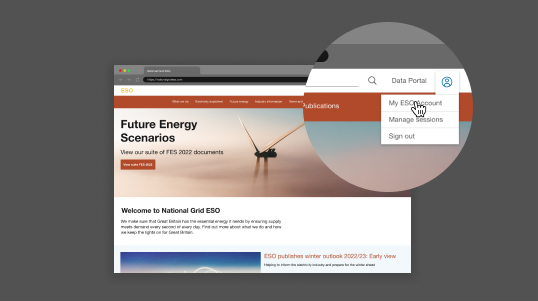ESO Data Portal Transition
We introduced the ESO Open Data Portal as part of the RIIO-2 business plan. Our aims were to:
- Deliver a foundational open data portal
- Make ESO datasets available to all
- Enhance transparency of our decision-making processes
We have made as much of our data as possible ‘open’. With a central library of published data with enhanced search capability, we've improved the experience for users of our data.
We have made it easier to maintain data quality standards and can present detailed descriptions of our data. We provide a range of options for consuming our data, such as APIs. This allows data to be combined into third party applications, reducing the transactional cost of using our data.
We will continue to improve transparency and build on our open data platform commitments. This will help to give our stakeholders the opportunity to drive insights from our data.
Digitalisation is key to capturing the benefits of the low-carbon energy transition for consumers. Quality data will be essential to developing new markets and empowering efficient decision-making. As one of the main custodians of energy data in the UK, the ESO will play a central role in fulfilling its potential.
What's next?
We are moving to publish data directly into the Data and Analytics Platform (DAP). This will improve data accessibility and transparency among stakeholders. It will provide trusted source of data that is discoverable and accessible. DAP will be a self-serve platform for data product development, with improved features including:
- Ability to ingest and consume data
- Data lineage
- Enhanced data quality
- Metadata
- Visualisation tools
- Data manipulation functionality
In the next release of DEP (Digital Experience Platform) we are planning to release the below improvements:
- Data portal front-end pages including integrated Data Portal Search
- Sign-up capability for data portal subscriptions
- Email & SMS notifications of changes to datasets
- ESO Account Dashboard (with the ability to view and manage dataset subscriptions)
Our existing query management process is also intended to be automated, so that we can improve efficiency, accuracy and response times. It will help in reducing manual effort, minimising errors and enables better tracking and monitoring. Once the query has been submitted it will perform intelligent routing and assignment of queries to the appropriate teams or individuals, tracking and monitoring of query status, and generating automated responses will also be enabled.
How can I get involved?
We are keen to engage with consumers of our data to understand your needs and ideas. This will help inform future developments to the Data Portal and to identify and prioritise new datasets.
If you have any feedback or would like to be involved in a future session, get in touch at [email protected].
